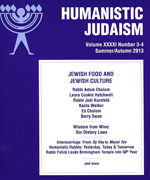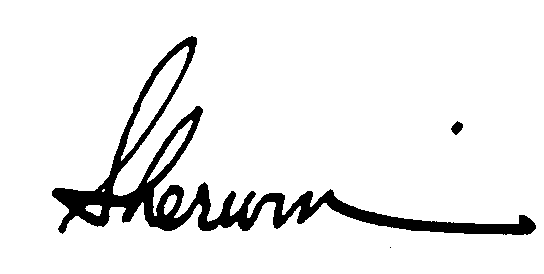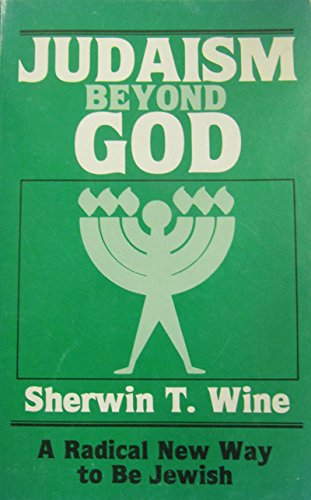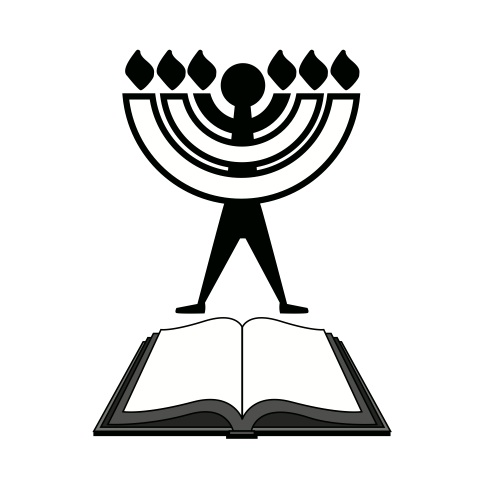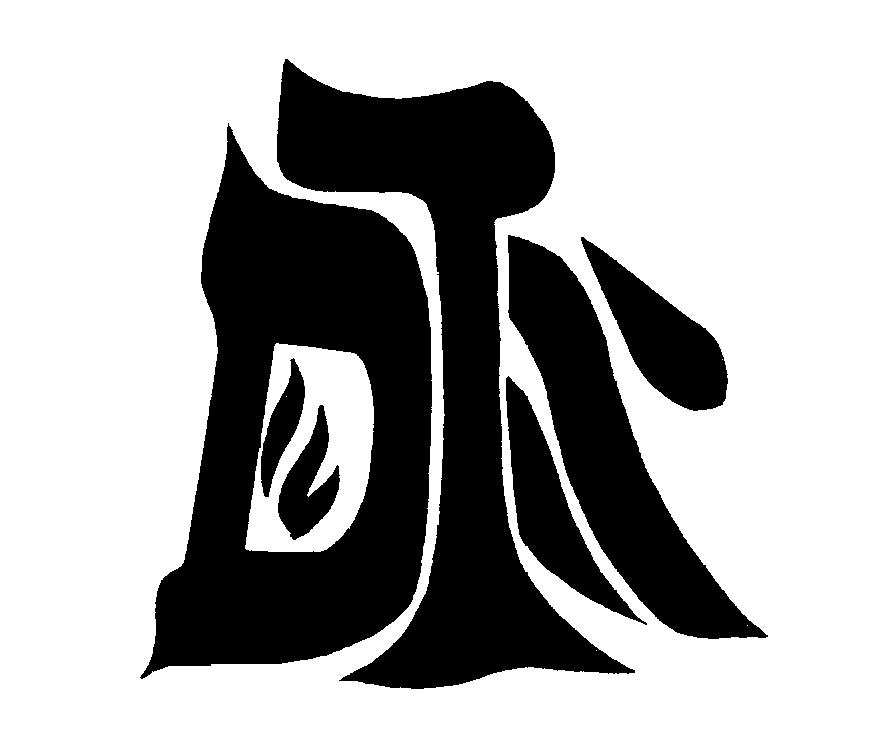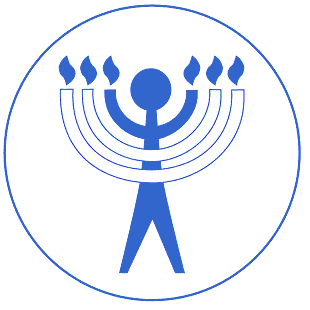Humanistic Judaism journal, Spring 1987
What I’d like to do first is to test your limits with regard to what is a meaningful Jewish identity.
You are the son of a survivor. You have no religious inclinations of any kind; in fact, the Holocaust has turned you off completely. When people ask you about your Jewish identity, you tell them you don’t celebrate Rosh Hashanah, Yom Kippur, Sukkot, Shavuot—that you don’t care about the holidays. However, you say your Jewish identity is very important to you because Jewish history for you is connected to your own philosophy of life. Your own philosophy of life is secular and humanistic. You believe you are in charge of your destiny. You believe that the message of Jewish history is precisely that.
You are an Israeli, and if there is one thing you hate, it’s religion. You were born in Poland. Religion was stuffed down your throat. You came to Israel. Now you love to go to the beach on Rosh Hashanah. If somebody asked you about your Jewish identity, you’d say, “I don’t have to worry about it. I speak Hebrew all day.”
You are an Anglo-Saxon atheist. You grew up in the Bronx. Most of the people in your neighborhood were Jews. You went to a predominantly Jewish high school. You come to a college where 50 percent of the students are Jewish and as time goes on you recognize that most of your life is spent with Jews. Then one day you decide that you’d like to be Jewish. You identify with the history and the fate of the Jewish people. Most of your friends are Jews. You start telling people you are Jewish.
You are an attorney. You have very little interest in formal religious activity, but you went to Israel in 1968 and you were turned on. Every year when the United Jewish Appeal comes around, you are involved. You feel very, very Jewish, but most of your Jewish activity is raising money for Israel.
You are a parent. You are a secular Jew, and the one thing you hate to do is to light candles. However, you’d like to do something for the Shabbat. You decide to choose some of your favorite Jewish poetry and, just before the meal begins, to read a poem or two to your family.
You are a graduate student. You become very much involved with Zen Buddhism. But you love your Jewish identity. You say to yourself: My philosophy of life is Zen, but my culture is Jewish. I’ll learn Yiddish, I’ll learn Hebrew—I’ll do Zen in Hebrew.
You are a yored, one of those people who leave Israel and come to live in Detroit to make money. People write you letters from back home, and you always write back that you are just here temporarily and you intend to go back. You have no religious inclinations whatsoever. You feel guilty about the fact that you have left the land of Israel, but when people ask you about your Jewish identity you say, “I fly to Israel twice a year. I have that connection. I live in a world where in thirteen hours I can get there.”
You are an attractive woman, and your parents have been waiting for a long time for you to marry a Jewish man. At the University of Michigan, you meet a man who is not Jewish but whom you love intensely. You are a secular Jew, he is a secular Anglo-Saxon, and you ask yourself: Can this marriage work? Your parents say it can’t, and they add, “If people like you do that, what is going to happen to the survival of the Jewish people?” You are torn between your own needs and the guilt that you feel. You say to yourself: I love my Jewish identity. I have a good strong cultural identity and that’s all I need. I can love somebody from another people. After all, I’m a humanist.
These are not idle stories. They are stories of people I have encountered. Maybe you have encountered some of them, too. They are people we bump into in North America, but I don’t think they’re confined to North America. I think these problems occur all over the Jewish world.
Today we have lots of people who claim to be Jewish in ways that are unacceptable to the tradition. I don’t mean whether the person is officially a Jew. According to Orthodox law, if you’re born of a Jewish mother and you run around doing Tibetan mantras, it’s all right; if you want to dress up as a Catholic priest, fine—your Jewish identity is secure.
I’m not talking about that. I’m talking about the “good Jew.” What are the parameters of a meaningful Jewish identity? At one time that was easy to answer because the rabbis were in charge, and it simply meant reverence for ancestors and obedience to Halacha [Jewish law]. Now that’s gone.
In the past two centuries, three options emerged.
The first was Reform, which responded to the tremendous changes that Jews were undergoing in the nineteenth century. Reform responded to Jewish needs by defining Jewish identity as a religious identity. We were a religious denomination, and in that way Jews would be able to live acceptably in this modern, open world that had been created by the Enlightenment and the Age of Science. But Reform ideology has collapsed. For one thing, many Reformers, although they talked a lot about God, were basically closet humanists. Secondly, when racial anti-Semitism grew at the end of the nineteenth and beginning of the twentieth century, the idea of a purely religious Jewish identity collapsed. Today the Reform movement certainly is strong, but its ideology is pasted together. The heart of the old ideology is gone.
Then there was Yiddish nationalism. What a powerful movement that was, based on a living people in Eastern Europe. But then that was tested by the Holocaust.
And, last, there is Zionism. The most successful modern Jewish response to the issue of a meaningful Jewish identity, an alternative to tradition, has been the Zionist movement. Israel’s coming into existence, its perseverance and its centrality in Jewish life have certainly demonstrated that Zionism is a viable alternative. But Zionism also has been tested. One of the things that Zionism was to do was to get rid of the galut, the Diaspora, and to “normalize” the Jewish people. But the Diaspora embarrassingly remains and most likely will continue to remain—which makes the Jews still abnormal and Israel part of a world Jewish people.
Zionism was supposed to provide a place where Jews would have their own land, and that has presented a problem. If you live in Israel today, you are very much aware of the fact that of the five million people who live within the present boundaries of Israel, including the occupied territories, close to two million are Arabs. You can’t live in Israel without being aware of the fact that you’re living, like the English in Canada, in a binational state.
It’s very difficult to talk about contemporary Jewish identity for a variety of reasons. First of all, each of us has a vested interest. If you’re Zionists, you want to imagine that ultimately all Jews will choose to come to Israel or—and you hear this all the time—that the galut will fade away. If you’re socialist, you still dream that somehow or other those collectivist impulses of the masses will come back together.
One of the problems we have in dealing with the present is that we never have experienced anything like it before in Jewish history. We make decisions that may be morally appropriate, but our ancestors wouldn’t approve so we feel guilty. One of the reasons we have difficulty is that the primary question on any Jewish program, even secular programs, is: What is going to happen to the Jewish people? What can we do to ensure Jewish survival?
That question prevents us from dealing with the basic issue. The best method I know of for ensuring Jewish survival is the Lubavitcher method. If your primary value is Jewish survival, then integrity is not the issue. What you will do is join the group that will provide maximum survival. You don’t believe, true, but you will join the group and dress up like a Lubavitcher, behave like a Lubavitcher, say you believe all the things Lubavitchers are supposed to believe because your primary value is Jewish survival.
It’s very dangerous for humanists to go around saying that the preservation of the Jewish people is the first value of Jewish life. There have to be other values. But generally when people talk, survival is what comes up. That’s the anxiety.
People say, “What we need is more education,” or “What we need is more services,” or “What we need is more Yiddish culture.” But what we demand of people, if it’s going to be effective, has to be related to what they feel they need.
So if we’re going to be able to do something for Jewish identity today as Secular Humanistic Jews, then we have to be aware of the nature and needs of the Jew today. What are the changes that have transformed Jewish life? What are the implications of these changes? How ought we to deal with them?
Let me list the changes that have taken place over the past two centuries. There has been a belief revolution—the Age of Science—that has undermined the old faith-belief system.
There has been a history revolution. You can no longer read the Bible and take it literally. We’re not even sure that Abraham, Isaac, and Jacob were real people. We’re not even sure that most of the stories told about Moses are the real stories. We’re not even sure any more about the actual origins of the Jewish people.
There has been a secular revolution. Today most Jews do not go to Jewish institutions for their education. Even Jewish institutions in the Jewish state in many ways are replicas of what we call secular education. Today Jewish children do not spend most of their time worrying about Torah and Talmud. They’re dealing with physics, chemistry, and so on.
We’ve been changed by affluence. In a subsistence culture, the basic question is group survival. Today I find that most Jewish young people in North America are unconcerned with that—and I’m not sure it’s that different in Buenos Aires or even in Tel Aviv, and I know the kibbutzim are experiencing the problem. At one time you could say to someone, “What have you done lately for the group?” Now people ask, “What do I need for my happiness? Don’t tell me what the group needs. What is the group going to do for me?”
We’ve been transformed by technology. The contemporary Jew lives in a global village. It’s easier to go from Chicago to Tel Aviv than it was a century ago to go from Chicago to Milwaukee. You just dial and you get South Africa, Zanzibar, or Brazil; you can talk to somebody in a moment.
We’ve been transformed by urbanization. Even in Israel, most of the people live in Haifa, Tel Aviv, or Jerusalem. Most Jews live in centers of culture and power.
We’ve been transformed by intermarriage. In North America, close to 40 percent of Jews marry non-Jews. It is not true that most of those people seek to leave the Jewish people. They simply live in an open society, where they fall in love with people who are not members of their own group. They have children, many of whom have Jewish last names and live in a world in which their identity sometimes is held suspect by Jews who are very much into policing Jewish identity.
We’ve been transformed by utopianism. There are many people in this room who remember the ’20s, the ’30s, or the ’40s, when many people believed that a socialist revolution would change the world. We’ve lived through a lot of revolutions, Bolshevik and fascist, and now even some of the most ardent people on the left have discovered that maybe we have to reevaluate where that’s going. If you look at the temper of young people today, in North America at least, their political affiliations certainly don’t coincide with what they were back in the ’60s or back in the ’30s.
We’ve been transformed by anti-Semitism and the Holocaust, which destroyed one-third of our people.
The most dramatic event transforming Jewish life is what I call the Zionization of the Jewish people, the establishment of Israel, and the emergence of Israel as the focal point of Jewish life.
Last, we have what I call the Anglo-Saxonization of Jewish life. When you watch the behavior of young people in Tel Aviv, or even middle-aged people, you find that they are part of the consumer culture that was developed here in the United States. The consumer culture is exportable. It’s going everywhere in the world.
Today, after the Holocaust, the largest Jewish community in the world, more than six million, resides in North America, and the power and influence of that community, certainly with regard to Israel, is enormous.
What are the implications of all this? The contemporary Jew lives in unique circumstances. People will say, “We’ve had anti-Semitism before and we’ve had changes before,” But I don’t know of any other society where the rate of change has been what it is in our society. We are assaulted by so much change that we suffer from future shock. We’re living in the present and future all the time.
One of the reasons why it often is very difficult to use traditional texts, unless you simply lift a quotation out of context, is that all these marvelous people were answering anxieties that came out of a more agrarian culture. Some of our anxieties today are the same, but many are not.
One of the anxieties that I encounter all the time among people whom I counsel is the inability to handle all the things that are changing in their lives. Their careers change, their marriages break up, the neighborhood doesn’t work and they’re forced to move, their skills become obsolete.
The contemporary Jew generally knows what he does not believe, but he hasn’t yet figured out what he does believe. People haven’t figured out what they do believe because things change so fast.
The contemporary Jew has to try very hard to believe traditionally. The fundamentalists that I encounter are, in many respects, different from the pious people of the past. When you live in an environment in which it is very hard to believe what you’re supposed to believe, you develop a desperate posture. At one time the stories in the Bible were believable. People believed in that kind of a world. It was easy because everybody did. Now, if you want to believe in the miracles of the Bible, you have to make an effort. You have to apologize, defend, explain; and what it produces is this enormous militancy.
The contemporary Jew has higher expectations. When I was a child, people were accustomed to suffering. What else was there to life? You suffered. Now people want happiness and fulfillment, and when they come to the temple or synagogue, they want magnificent aesthetic experiences. I remember people sitting in shul [synagogue] and being bored for hour after hour after hour. I can’t imagine my father using the phrase “aesthetic experience.”
The contemporary Jew knows that survival is not enough. Secular Humanistic Judaism will never get off the ground if its only focus is on what we can do to insure Jewish survival because Jewish survival is not the primary agenda of most Jews today, not even in Israel. The primary agenda of most people has to do with their own personal needs, and unless you have something to say philosophically, poetically, or whatever, to their human condition—not just to their Jewish condition—how will you ever reach them?
The contemporary Jew lives with everybody, and this relates to Israel as well as the rest of the world. There was a time when Anglo-Saxons imagined that the United States could be an Anglo-Saxon country. But immigrants came—Polish, Italians, Jews, Russians, and the rest. Even Anglo-Saxons are now regarded in America as an ethnic group. The reality in Israel too is that Jews live with Arabs. They may not want to. They may feel like the whites in my neighborhood who don’t want to live with blacks just a few miles away. Go find a place in the world today where Jews will not have to relate in some way, either friendly or hostile, to others and to share space.
The contemporary Jew lives in a world culture. If I were a tourist in Japan a century ago, I would not have known how to relate to it. Nobody would have spoken English. I wouldn’t have understood the artifacts. What is happening in the world today is that there is a kind of universal culture created by modern science and technology.
The contemporary Jew has the freedom to make his own options. Even in dictatorships or juntas, as long as you don’t assault the authorities, they don’t care whether you observe Shabbat but not Sukkot, observe Sukkot but not Shabbat, eat pork but not shrimp, eat shrimp but not pork. What happens now in the world is that each Jew develops his own private Jewishness. I know somebody who will eat ham, but not with milk.
The contemporary Jew lives with chronic anti-Semitism. It is quite true that in the Soviet Union, were it not for chronic anti-Semitism, a lot of the people who are now proclaiming their Jewishness would not have done so. One of the major preservatives of Jewish identity—certainly in modern times—is the sense of guilt that people who are members of a vulnerable group feel. The removal of anti-Semitism won’t happen and for a very simple reason. We Jews by our lifestyle—this over-urbanized people of professional education—represent an adaptation to the modern world that other people do not have. Anti-Semitism in the twentieth century was never directed primarily toward the beliefs of the Jewish people: it was directed toward the image of the Jew, the city slicker, the person who was difficult to comprehend and who was envied and feared.
The contemporary Jew experiences Israel as the most dramatic event, the most dramatic aspect of Jewish identity today. The one thing that is the big turn-on for Jewish identity is the connection that people have to Israel. There may be people who have objections to some of its policies, but the reality is that over the years, some of the most militant anti-Zionist groups dramatically modified their positions. Because in the end, you’re not going to be able to look at Israel and say, “You’re insignificant.”
Last and most important of all: In order to understand what Jewish identity means, we have to understand that we are an international people. In this city of Detroit [in the 1920s], Henry Ford published and circulated the Protocols of the Elders of Zion, the most vicious anti-Semitic writings of the twentieth century. We were called “the international Jew.” We were called that also by Father Charles Coughlin, who at one time had aspirations to be President of the United States of America. The assault bears some truth. One of the reasons why people have difficulty digesting us is that indeed we are a nation that became an international nation. No matter what people do to normalize us, that’s what we remain. In the age of modern technology, when it’s easy to fly back and forth, and there is economic stress and people look for a place where there are suitable outlets for their career skills, Israelis and Diaspora Jews keep moving back and forth. It is highly unlikely, given the technology of 60 to 100 years from now, that national boundaries will be of enormous significance. They will be there, obviously, and nationalism will certainly be strong, but an international people may indeed be the wave of the future.
How do you cope with all these changes? One way is denial. This is something you hear frequently: “Do you know what is great about the Jewish people? The Jewish family.” In Oakland County, Jews have a 50 percent divorce rate. What are they talking about? Denial means unpleasant facts are forgotten, and what we have is a cliché that comes out of the past.
Then there is rejection: people who say, “I don’t like the modern world. I don’t like what’s happening.” We have fundamentalists in the Jewish world, as well as in the Muslim world and the Christian world.
The third way is guilt. Guilt is when you say “Maybe I can have it both ways. Maybe I can change and not change at the same time. What I’ll do is go to Yom Kippur services and fast, and then I’ll break the fast with shrimp and scallops.” The texts of the past may not necessarily say what I believe, and what I could do with integrity is to allow them to say what they say because the authors of those texts are entitled to their integrity, and I want to hear what they have to say. I don’t need them to “kosherize” me. But if I’m ambivalent and feel a little guilty, I say “I’ve changed, but if my ancestors were living here today, they’d say ‘Good boy, Sherwin.’”
The fourth way is called avoidance: “I want Jewishness for music, a little dance, a little song. That’s all. If I want a philosophy of life, I’ll go elsewhere.” The power of historic Judaism lay in the fact that it incorporated both a culture and a philosophy of life, Now for a lot of people it’s just cultural tidbits.
Let me conclude with what I consider to be the pattern of integrity. The pattern of integrity responds to the realities by taking them seriously, and, if we take them seriously, six propositions follow:
If we are going to be effective as Secular Humanistic Jews in the twenty-first century, the first thing we have to do is relate to the needs that people have as human beings, to their human condition, and not always talk only about a Jewish culture but also talk about a philosophy of life. I believe that unless we have a secular humanistic answer to the questions, “What do I do with my emotions?” and “What do I do with my life?”—unless we spend time on these questions within the framework of Secular Humanistic Jewish groups, we’re not going to hold anybody. You can’t build on cultural tidbits.
The way of integrity means that you tie the Jewish experience to that philosophy. I am a secular humanistic Jew not only because I was born of a Jewish family. I came to my secular humanism through my Jewish experience. I feel that Jewish history is not an expression of the presence of a loving and just God, but of the indifference of the universe to the human moral agenda; and if that’s the case, the meaning is that we human beings must assume responsibility for our fates. My Jewish experience is tied to my philosophy.
The third proposition is that we must innovate. The most successful Jewish enterprise in the twentieth century was not just the creation of Israel; it was the revival of modern Hebrew. What we Secular Humanistic Jews have to do is to invent alternative ways of doing all kinds of things. We’ve been doing it for a long time—Shabbat, Pesach, bar and bat mitzvah. It’s not simply a matter of rescuing the old; it’s a matter also of inventing the new. We may even invent new holidays.
The way of integrity means that we live with openness. As far as I’m concerned, anybody who wants to be Jewish can identify with the fate of the Jewish people—to that person, we should say, “Welcome.” Does an Anglo-Saxon atheist from the Bronx want to be Jewish? Terrific. Why not? Does somebody want to be Jewish simply by participating in social and political action? Fine. Let each person choose what is meaningful. Our message to people is, “We do not oppose your right to develop your agenda. If you want to put Jewish identity at the top, that’s fine. If you want to make it fourth and you feel you have other concerns in your life that are more important, we’re not going to assault you with a lecture.”
If we have integrity, we reject messianic utopianism. By the end of the twentieth century, we’ve had enough preachers of utopia. We need people who are neither too pessimistic or excessively optimistic, but people who are realistic. I never say to people, “We Jews believe that ultimately peace will reign throughout the world.” I say, “From Jewish experience, it’s very iffy. We’d better do something about it. That’s the message of Jewish history.”
Perhaps most important of all, we have to accept that we are a world people. That’s what the International Federation [of Secular Humanistic Jews] is about. It means that people in the Diaspora recognize that Israel is, for all practical purposes, the center of the Jewish people and that Israelis recognize, without contempt, that the Diaspora is here to stay. And the only reason why Israel is significant is because it is attached to something called the Jewish people, which is a world people.
A good philosophy of life teaches people to face reality and to be strong enough to deal with that reality. The reason I regard myself as a Secular Humanistic Jew is that we affirm human dignity, which means we are not afraid to face the truth, both pleasant and unpleasant. That is our pride both as Jews and as human beings.

